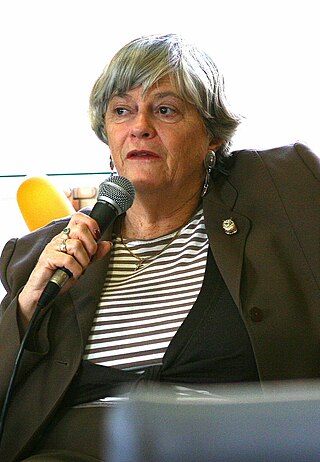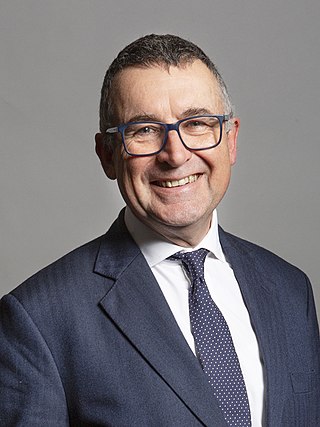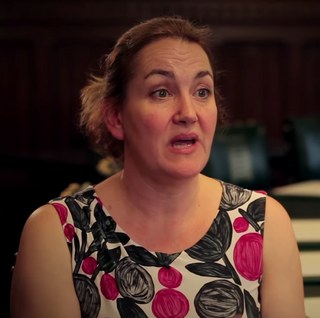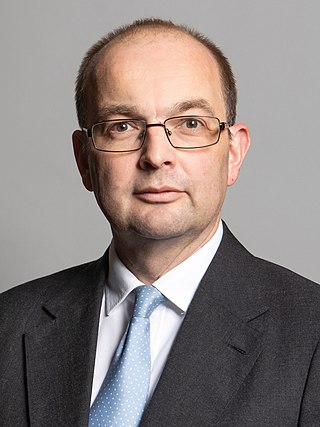
Ann Noreen Widdecombe is a British politician and television personality. She was Member of Parliament (MP) for Maidstone and The Weald, and the former Maidstone constituency, from 1987 to 2010 and Member of the European Parliament (MEP) for South West England from 2019 to 2020. Originally a member of the Conservative Party, she was a member of the Brexit Party from 2019 until it was renamed Reform UK in 2021; she rejoined Reform UK in 2023.

The Speaker of the House of Commons is the presiding officer of the House of Commons, the lower house and primary chamber of the Parliament of the United Kingdom. The current speaker, Sir Lindsay Hoyle, was elected Speaker on 4 November 2019, following the retirement of John Bercow. Hoyle began his first full parliamentary term in the role on 17 December 2019, having been unanimously re-elected after the 2019 general election.

Alan James Beith, Baron Beith, is a British Liberal Democrat politician who represented Berwick-upon-Tweed as its Member of Parliament (MP) from 1973 to 2015.

Alan Gordon Barraclough Haselhurst, Baron Haselhurst,, is a British Conservative Party politician who served as Member of Parliament (MP) for Saffron Walden from 1977 to 2017, having previously represented Middleton and Prestwich from 1970 to 1974. Haselhurst was Chairman of Ways and Means from 14 May 1997 to 8 June 2010, and later Chairman of the Commonwealth Parliamentary Association between 2011 and 2014. The oldest Conservative MP to stand down at the 2017 general election, he was created a Life Peer in May 2018, sitting in the House of Lords as Baron Haselhurst.

Sir Hugh Nigel Edward Bayley is a British Labour politician who served as the Member of Parliament (MP) for York Central, previously York and City of York, from 1992 to 2015.

John Simon Bercow is a British former politician who was Speaker of the House of Commons from 2009 to 2019, and Member of Parliament (MP) for Buckingham between 1997 and 2019. A member of the Conservative Party prior to becoming Speaker, he was the first MP since Selwyn Lloyd in 1971 to be elected Speaker without having been a Deputy Speaker. After resigning as Speaker in 2019 and opting not to seek re-election as MP for Buckingham in the 2019 general election, Bercow left Parliament. In 2021, he joined the Labour Party but was suspended in 2022.

Sir Bernard Christison Jenkin is a British Conservative Party politician serving as Member of Parliament (MP) for Harwich and North Essex since 2010. He also serves as chair of the Liaison Committee. He was first elected to represent Colchester North in 1992, and went on to represent North Essex before the Harwich and North Essex constituency was created.

Sir Edward Julian Egerton Leigh is a British Conservative Party politician who has served as the Member of Parliament (MP) for Gainsborough, previously Gainsborough and Horncastle, since 1983.

Sir Lindsay Harvey Hoyle is a British politician who has served as Speaker of the House of Commons since 2019 and as Member of Parliament (MP) for Chorley since 1997. Before his election as speaker, he was a member of the Labour Party.

Michael John Martin, Baron Martin of Springburn, was a Scottish politician who served as Speaker of the House of Commons between 2000 and 2009. A member of the Labour Party, he was the Member of Parliament (MP) for Glasgow Springburn from 1979 to 2005 and for Glasgow North East until 2009. He was elected as Speaker of the House of Commons in 2000, remaining in the office for nine years until his involuntary resignation in 2009.

Chorley is a constituency in Lancashire represented in the House of Commons of the UK Parliament since 1997 by Lindsay Hoyle. Hoyle was originally elected for the Labour Party, but in 2019 became the Speaker, making him unaffiliated.

Natascha Engel is a British former politician. She served as Labour Party Member of Parliament (MP) for North East Derbyshire from 2005 until her defeat at the 2017 general election.

Sir James Philip Duddridge, is a British politician and former banker. A member of the Conservative Party, he has served as the Member of Parliament (MP) for Rochford and Southend East since 2005. Duddridge previously held several ministerial positions under prime ministers David Cameron, Boris Johnson and Liz Truss.

The 2009 Glasgow North East by-election was a by-election for the Parliament of the United Kingdom's House of Commons constituency of Glasgow North East. The by-election was held on 12 November 2009 following the resignation of Michael Martin as an MP and as Speaker of the House of Commons following the MPs' expenses scandal. Martin was the first Speaker since Sir John Trevor in 1695 to be forced from office. Willie Bain, the Scottish Labour Party candidate, won with 59% of the vote. Just 33% of the electorate voted, which is the lowest ever percentage turnout in a Scottish by-election to the House of Commons.
The 2000 election of the Speaker of the House of Commons occurred on 23 October 2000 following the retirement of Betty Boothroyd as Speaker. The election resulted in the election of Labour MP Michael Martin, who had served as Deputy Speaker since 1997. It was the first contested election since 27 April 1992.

The election for the 158th Speaker of the House of Commons took place on 4 November 2019. Lindsay Hoyle was elected with 325 votes in the final ballot, out of a total of 540 votes cast.




















